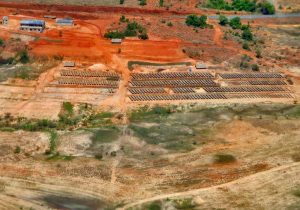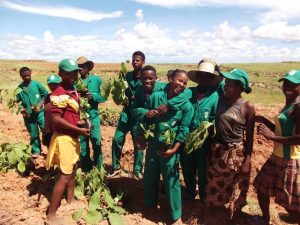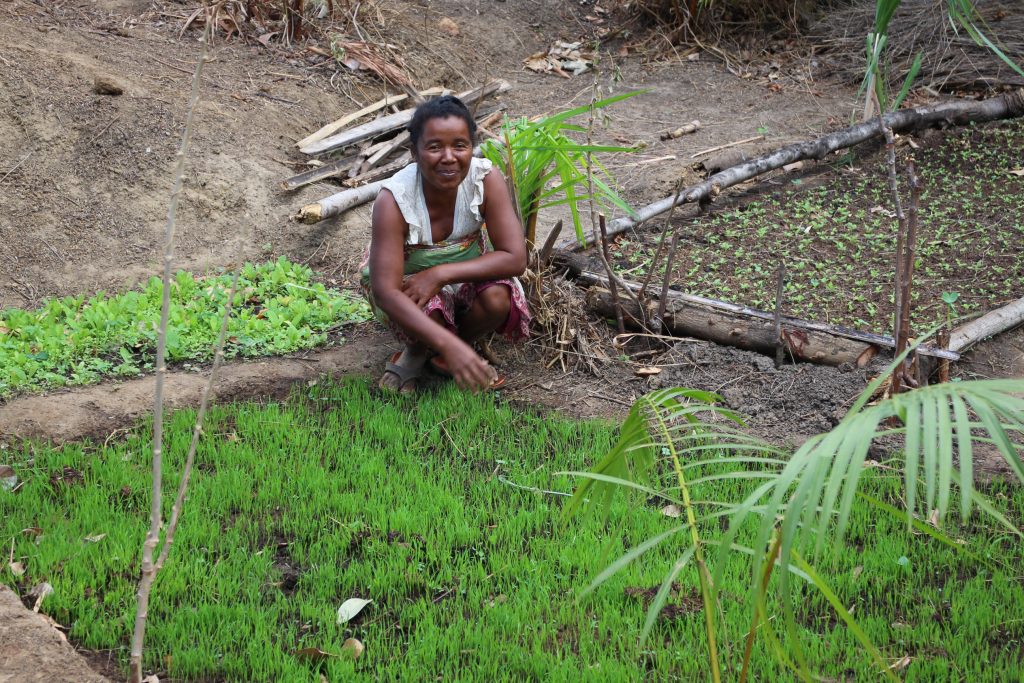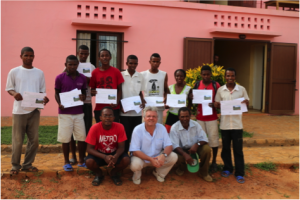“Numbers showing this horrifying evolution: in 1952 the island’s forest cover was of 87%, nowadays it only represents 8%… .”

The island’s natural resources have been extremely exploited since 1950. Excessively exported, the endemic wood species, such as teak and rosewood tree, have been victim of over exploitation. Numbers showing this horrifying evolution: in 1952 the island’s forest cover was of 87%, nowadays it only represents 8%…
The dizziness is harmful as well as for the endemic species and the autochthones whom food security is threaten. Dryness, lack of water and illnesses generated by deforestation also perturb the social balance.
This is how re-establishing a sustainable habitat is mostly necessary for human to be able to live in harmony with nature and to take sustainable care of it. It’s with this in mind that the EcoFormation Foundation created a training centre for forester engineers, aiming to train local people and raise awareness among deforestation consequences.
Billions of trees have already been planted but we need a little hand to implement even more ambitious actions!
“Numbers showing this horrifying evolution: in 1952 the island’s forest cover was of 87%, nowadays it only represents 8%… .”

1’200 Hectares in rice fields, intensive rice farming and market gardening in Madagascar
6’000 Hectares of reforestation in the Mampikony district of Madagascar.
17’500 Hectares of natural reserve to be restored in the district of Antsohihy in Madagascar.
11 Endemic forest species
23 Species of endemic birds
17 Species of endemic reptiles
 The positives observable effects (quantitatively and qualitatively) during the reforestation show (I) a new vegetation of the grounds, (II) the biomass transformation into humus, (III) the water storage and evacuation, therefore a relative dampness increase, (IV) the wind reduction and (V) the arrival of new habitats, protection of insects, reptiles, birds and little mammals. These new forest covers contribute to moor the ground and therefore decrease erosion, mudslides, to avoid waterways getting out of their beds and consequently devastate cultures and villages. For instance, impacts are measurable with indicators such as new covered grounds surface, trees density, forest species growth, flora and fauna activities.
The positives observable effects (quantitatively and qualitatively) during the reforestation show (I) a new vegetation of the grounds, (II) the biomass transformation into humus, (III) the water storage and evacuation, therefore a relative dampness increase, (IV) the wind reduction and (V) the arrival of new habitats, protection of insects, reptiles, birds and little mammals. These new forest covers contribute to moor the ground and therefore decrease erosion, mudslides, to avoid waterways getting out of their beds and consequently devastate cultures and villages. For instance, impacts are measurable with indicators such as new covered grounds surface, trees density, forest species growth, flora and fauna activities.
 The benefits, job creation throughout trainings offered to local populations and women independence to realise daily tasks (childcare infrastructure), aim to a get better social statute for women. The women involvement and independence throughout daily tasks realisation contribute to reduce household precariousness.
The benefits, job creation throughout trainings offered to local populations and women independence to realise daily tasks (childcare infrastructure), aim to a get better social statute for women. The women involvement and independence throughout daily tasks realisation contribute to reduce household precariousness.
47 Madagascan farmers received a nurseryman training, they are in charge of local patches productions (720’000 patches in 2010). 125 fixed jobs have been created within the cooperative formed by EcoFormation in favour of the locale population. 250 people are being employed in the nursery for seeding and maintenance daily tasks
 Independent cooperatives creation, exclusively possessed by local farmers are platforms which facilitate the promotion of surplus agricultural products in a fair trade context. These cooperatives are designed to forest product farming, responsible for sustainable management (PAG), and for forest sites maintenance, having as an objective to restart wood pathways. These cooperatives are also a source of complementary incomes for local farmers. In addition to all that, they will be supplied by carbon credit certificates bought by industrialized countries (emission/compensation in accordance with Kyoto’s protocol). The benefits, the promotion of natural resources, secondment of commercial canals for forest and agro products. Sources of complimentary incomes for local populations, 30% of sales incomes produced by credit carbon are redistributed to members. Sources of funding for the cooperatives, 30% of sales incomes produced by credit carbon are dedicated to the cooperative in order to invest; for instance, into drinkable water catchment or facilitation access to medical care. Sources of funding for similar reforestation projects, 40% of sales incomes produced by credit carbon are consecrated into the lunch of new reforestation projects.
Independent cooperatives creation, exclusively possessed by local farmers are platforms which facilitate the promotion of surplus agricultural products in a fair trade context. These cooperatives are designed to forest product farming, responsible for sustainable management (PAG), and for forest sites maintenance, having as an objective to restart wood pathways. These cooperatives are also a source of complementary incomes for local farmers. In addition to all that, they will be supplied by carbon credit certificates bought by industrialized countries (emission/compensation in accordance with Kyoto’s protocol). The benefits, the promotion of natural resources, secondment of commercial canals for forest and agro products. Sources of complimentary incomes for local populations, 30% of sales incomes produced by credit carbon are redistributed to members. Sources of funding for the cooperatives, 30% of sales incomes produced by credit carbon are dedicated to the cooperative in order to invest; for instance, into drinkable water catchment or facilitation access to medical care. Sources of funding for similar reforestation projects, 40% of sales incomes produced by credit carbon are consecrated into the lunch of new reforestation projects.
 EcoFormation builds on every site a training and forest development centre for jobs such as nurseryman, forest ranger, agro-forester and agricultural mechanic. These trainings are approved by diplomas reputed by the project’s host states. Therefore, every year, 25 to 65 autochthones acquire a professional training. Local populations also participate in reflexion and awareness activities regarding environment and biodiversity of their region. Student exchange from host countries and Switzerland are realised in order to put into practice post-graduates training (forestry, agronomics and environment) on site. In that interaction training context, Universities and Ecoles Polytechniques locales and Swiss contribute to the programs development. The benefits, locale population is trained and raise awareness among participation into local development. Students exchange views are beneficial on a cultural, technical and operational plan
EcoFormation builds on every site a training and forest development centre for jobs such as nurseryman, forest ranger, agro-forester and agricultural mechanic. These trainings are approved by diplomas reputed by the project’s host states. Therefore, every year, 25 to 65 autochthones acquire a professional training. Local populations also participate in reflexion and awareness activities regarding environment and biodiversity of their region. Student exchange from host countries and Switzerland are realised in order to put into practice post-graduates training (forestry, agronomics and environment) on site. In that interaction training context, Universities and Ecoles Polytechniques locales and Swiss contribute to the programs development. The benefits, locale population is trained and raise awareness among participation into local development. Students exchange views are beneficial on a cultural, technical and operational plan